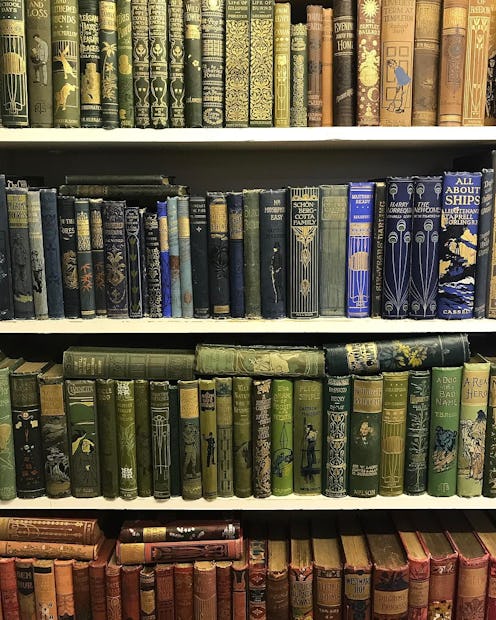Books
8 Books That Changed The Way We Live Our Lives
Every so often, we come across a life changing book. It doesn't have to be the best book we've ever read, or even a book we particularly like—but something about it changes our lives all the same. We decide to go vegetarian, or we start paying attention to politics, or we realize that our current boyfriend bears far too much resemblance to a fictional villain and finally break up with him. Those books are pretty rare, but even rarer are the books that change everyone's lives. Some of these books have even altered the course of history and changed society as we know it. So, if you're looking to turn over a new leaf, here are a few books that changed the way we live our lives.
It always confuses me when people make the argument that it's "just a book," or "just a movie/TV show/interpretive dance," as though media has never changed the way that people go about their lives. Books have started wars, inspired political revolution, and made everyone feel weird about the meatpacking industry. Life as we know it would look very, very different if we lived in a world with different literature, and these are just a few of the books that have changed our daily lives:
1'The Jungle' by Upton Sinclair
The Jungle completely changed the way that people felt about meat, which was... not really what Sinclair was going for. He meant to show the public just how abysmal working conditions were in the meatpacking industry, hoping to spark widespread labor reform. Instead, readers were seriously grossed out by the unsanitary conditions depicted, and wanted to protect their own steak dinners from contamination, and now we have food safety laws and the FDA.
2'Ten Days in a Madhouse' by Nellie Bly
If you've never heard of Nellie Bly, go look her up right now. She basically invented investigative journalism, she traveled around the word (alone) in well under 80 days, and she had a pet monkey. As one of her first investigative efforts, she had herself committed to an insane asylum for ten days, then wrote about her horrific experience and got the abusive asylum shut down. Her book went a long way towards curbing the abuse of the mentally ill, and changing public perceptions of mental health (like, maybe it should be about helping people instead of locking them in windowless cells?).
3'Silent Spring' by Rachel Carson
Silent Spring is often credited with kicking off the environmental movement as we know it. Carson's nonfiction classic caused public outcry: the damaging pesticide DDT was banned, and new environmental protections and regulations were put into place. Readers started thinking of nature, wildlife, clean water, and clean air as things that needed to be protected from human destruction, rather than as an indestructible fact of the universe.
4'The Grapes of Wrath' by John Steinbeck
The Grapes of Wrath forced readers to see poor people as human beings. It wasn't the first novel to ever do this, nor was it the last, but Steinbeck's classic had a huge impact on public opinion during the Great Depression. He tells the story of one family forced to head west in the Dust Bowl migration, and faced with the harsh realities of life as a migrant worker in California.
5'A Vindication of the Rights of Woman’ by Mary Wollstonecraft
Before The Feminine Mystique made upper middle class white housewives yearn for more, A Vindication of the Rights of Woman put forth that radical notion that maybe women are people. Mary Wollstonecraft was considered a political rebel in her day, but her early feminist manifesto did manage to inch public perception towards a slightly more proto-feminist bent (and then her daughter invented the sci-fi genre and wrote Frankenstein, because they were just a rad family).
6'Ain't I a Woman: Black Women and Feminism' by bell hooks
bell hooks is certainly not the only writer to ever bring the intersection of race and gender into the public eye, but Ain't I a Woman was one of the first major works to explore the complex relationships between different forms of oppression. She didn't instantly make all readers into thoughtful, inter-sectional feminists, but she changed the conversation around feminism at the start of the 21st century (and a lot of people are still catching up).
7'All Quiet on the Western Front' by Erich Maria Remarque
We now think of "anti-war" novels as a classic genre of literature: naturally, all books about war are going to end with the message that war is bad. Right? Actually, All Quiet on the Western Front was a groundbreaking novel, and its anti-war message was not considered universal common sense at the time. With his portrait of the misery and senseless violence of WWI, Remarque made a huge impact in the way that we all think about war, patriotism, and glory.
8‘The Interpretation of Dreams’ by Sigmund Freud
Most of Freud's theories have still been largely discredited, and we still use his psychoanalysis as the basis for so much of our literature, thinking, and dream interpreting. Despite being kind of the worst, Freud was the father of modern psychology, and we still spend a frightening amount of time engaging in pseudo-Freudian analysis of our friends and enemies.
